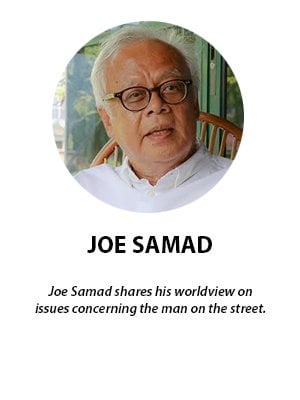 The use of the word “Allah” has become a controversy again although it has been used for more than 400 years by non-Muslim natives in Borneo. This single word can threaten the peace and stability of East and West Malaysia, if the issue is not resolved quickly.
The use of the word “Allah” has become a controversy again although it has been used for more than 400 years by non-Muslim natives in Borneo. This single word can threaten the peace and stability of East and West Malaysia, if the issue is not resolved quickly.
In March 2021, after a legal battle that lasted more than a decade, the High Court granted a Sarawakian, Jill Ireland, the right to use the word “Allah” in her religious practice.
“Allah” is a generic Arabic word describing a higher being or “god”, and no one anywhere in the world holds a copyright or claim for exclusive use of the word, except some people living in Peninsular Malaysia.
High Court judge Nor Bee Ariffin also ruled that Christians in Malaysia can use three other Arabic words in their religious publications for educational purposes. The three other words are “Baitullah”, “Kaabah” and “solat”. Her ruling held that a home ministry directive in 1986 prohibiting the use of these four words was filled with illegality and irrationality.
The attorney-general’s decision to discontinue the appeal against the High Court’s decision was probably to demonstrate that the unity government cares for the people and respects their respective customs and languages.
Muslims against the ban
Muslim scholars and clerics, both locally and worldwide, had criticised the ban in the past, pointing out that the word predates Islam and it means “God” in Arabic.
In July 2014, Perlis mufti Asri Zainul Abidin, known as a voice of reason sometimes and to critics as a “promoter of liberalism”, was one of those who had criticised the “Allah” ban. He previously said as long as the word “Allah” was used to refer to “the Most Supreme Being”, non-Muslims could use the word.
“So actually, it is a non-issue. Muslims believe in one God. So how can we say your God is different from mine?” he had said. Unfortunately, logic is not in some people’s heads; they see this as an opportunity to make a mountain out of a molehill.
‘Treated with condescension’
Vocal Muslim activist Ahmad Farouk Musa, who used to head Islamic NGO Islamic Renaissance Front, has commented that Muslims are treated with condescension in Malaysia. It’s ridiculous to think that we Muslims would start converting to other religions merely because people of other faiths used the word “Allah”.
As a Muslim, one should question whether our faith is that shallow or if we are weaklings who would succumb to one word found in a non-Muslim text, and then rush to the nearest church to be converted to Christianity.
Having been educated at mission schools locally and overseas, where it was compulsory to attend assemblies at chapels, I find that notion hard to believe. I am still a Muslim today.
I am reminded of a case of a Universiti Utara Malaysia academic who claimed that an autobiography of former Selangor assembly speaker Hannah Yeoh which he had bought could influence him towards Christianity.
I guess everyone has a weakness and maybe people like him need special protection.
Passing on a ‘hot potato’
Some feel that the Cabinet decision to refer the matter to the Conference of Rulers may be inappropriate. Some legal minds have said that it’s a matter of law and there should be a continuance of the appeal to bring the matter to its finality.
The Cabinet which comprises ministers from Sabah and Sarawak, should know very well that freedom of religion is a sensitive topic among the ethnic populations of the two states.
Referring the matter to the Rulers is like passing a hot potato from one hand to another.
The current government needs to be brave enough to take a stand.
Politically driven for ulterior motives
The issue over the word “Allah”, as we know, has been politically driven to suit the ulterior motives and agendas of some.
One member of the legal fraternity said that though the Rulers are recognised as the heads of Islam in their respective states, the matter is one of law, about the use of a particular word, and not so much about religion.
Reference to the Rulers’ conference could also be seen as mocking the judiciary.
A better option to preserve the unity of the nation is to settle the matter out of court.
A case in point is when the Sarawak government took Petronas to court over the payments of outstanding petroleum sales tax. Sarawak won its case while Petronas appealed. Eventually, Muhyiddin Yassin, who depended on the support of Sarawak MPs to remain in power, decided it was wiser to have a political settlement. Petronas was forced to discontinue its appeal. Eventually, Sarawak was paid the RM2.9 billion owed to them by Petronas.
20-point safeguards
This “Allah” issue is tied to the Malaysia Agreement 1963, which leaders in the Borneo states have been fighting for, left, right, and centre.
In the 20-point safeguards for Sabah, the federation’s founding leaders made sure that “freedom of religion” was the number one priority.
It is etched in the Keningau Oath stone for every Malaysian to see if they visit Keningau. That was the federal government’s promise to the native chiefs of Sabah.
Dishonoring the promise is dishonoring Malaysia and what it stands for, as prescribed in the Rukun Negara. - FMT
The views expressed are those of the writer and do not necessarily reflect those of MMKtT.



No comments:
Post a Comment
Note: Only a member of this blog may post a comment.